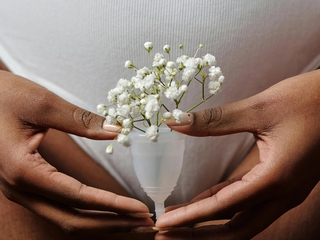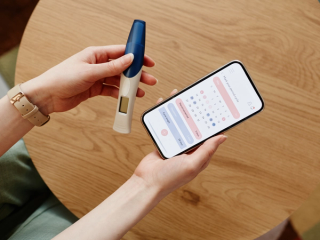
- Home
- Advice Hub
- Conception
- Fertility & Infertility
- Fertility After Miscarriage: What To Know And Expect
Fertility After Pregnancy Loss or Miscarriage: What to Know and Expect
Explore fertility after miscarriage—what to expect, when to seek help, and tips for boosting chances of conceiving again.
Going through a miscarriage or pregnancy loss can be an incredibly emotional and physically demanding experience, and it's completely natural to feel a range of emotions during this difficult time, and to have many questions as to why this happened to you, and whether will it happen again? Here, we try and answer the main questions about fertility after miscarriage or pregnancy loss to hopefully provide support and advice. It’s also important to note there are a number of charities working in this space, such as Tommy’s, The Miscarriage Association, and SANDS, all of which can provide specific guidance, resources and support.
What is a miscarriage or pregnancy loss?
A miscarriage is a pregnancy loss before 24 weeks of gestation. Miscarriages, especially early miscarriages before 12 weeks of pregnancy, are more common than many realise, affecting about 10-20% of known pregnancies, so you’re not alone. When a baby dies after 24 weeks of pregnancy, this pregnancy loss is known as a stillbirth. Sadly, stillbirth occurs in around 1 in 250 births in the UK.
Miscarriage can be further categorised as follows:
- Chemical pregnancy – An early loss that occurs shortly after implantation.
- Missed miscarriage – When the foetus stops developing, but bleeding or pain does not occur immediately. You may only find out you have had a missed miscarriage when you go for a scan and no heartbeat is seen.
- Incomplete miscarriage – When bleeding and pain occur, but some pregnancy tissue remains in the uterus.
- Ectopic pregnancy – Where a pregnancy occurs outside the uterus, commonly in the fallopian tube. Sadly, an ectopic pregnancy is not viable and can be dangerous, but with early medical intervention, it can be managed safely.
- Recurrent pregnancy loss – Defined as three or more consecutive miscarriages.
What causes miscarriage?
This is the big question, isn’t it? It is important to know that it is very unlikely that it was anything you did or didn’t do. The majority of pregnancies end because of chromosomal abnormalities, meaning the embryo has missing or extra chromosomes that are incompatible with life. Hormonal imbalances like thyroid disorders or polycystic ovary syndrome (PCOS) can also increase the risk of experiencing a miscarriage, as can structural problems in the uterus or cervix – either of which might be unknown at the point of conception, or until you experience difficulty conceiving. Infections and autoimmune disorders can also lead to problems with foetal development that might end in miscarriage.
One of the hardest things about pregnancy loss is that you may never know what caused it. However, if you experience recurrent miscarriages, the NHS will offer investigative tests to try to ascertain the cause.
How does miscarriage affect fertility?
While many women go on to conceive successfully after a miscarriage, there are physical and emotional effects that may impact fertility.
Physical effects:
Immediately after a miscarriage, your body is still healing, and hormone levels are returning to normal. You’re advised not to have sex until your miscarriage symptoms have gone and to take it easy while you recover. Your periods should return within 4 – 8 weeks of pregnancy, but it could take months to get back into your usual cycle and for hormone levels to return to normal. On the other hand, some people go on to have successful pregnancies right after miscarriage, so there’s no hard and fast rule.
If your miscarriage required medical intervention, your uterus may need time to heal before implantation can be successful. If your healthcare provider has identified any structural issues that caused the miscarriage – for example, the presence of fibroids – it may be necessary to address these before trying to conceive again.
Emotional effects:
For many people, the emotional effects of miscarriage are harder to bear than the physical effects. Grieving the loss of your baby and the future you planned, and feeling anxious about future pregnancies can impact your overall wellbeing, your mood and your libido. It’s so important to give yourself time to grieve and to talk to friends, family or a trained professional to support you through this difficult time. If you can, wait until you feel ready to try again and, in the meantime, concentrate on self-care and time with your partner. Many people find it helpful to connect with support groups or others who've experienced miscarriage.
When to seek fertility help after a miscarriage
After a miscarriage, most people can conceive again naturally. However, if you've had multiple miscarriages or are struggling to conceive after a certain period, it's worth seeking support.
When to go back to your GP
It’s important to inform your GP of a miscarriage, even if you feel like you don’t require medical intervention. If you experience recurrent miscarriages (3 or more) or do not conceive after 6 months of regular unprotected sex, your GP can investigate whether there is an underlying issue, such as hormonal imbalance or fibroids, which can be resolved.
When to expect NHS support
The NHS will usually offer further investigation to those who have experienced a late-stage pregnancy loss or three consecutive miscarriages. Testing should also be offered to those who are struggling to conceive after trying for a year. It may be less if you have conceived successfully in the past. Some of the support varies according to what is offered by your local Integrated Care Board (ICB), so find out what’s available in your area. Find your local ICB here.
How to enhance fertility after miscarriage
The most important thing to do after a miscarriage is look after yourself. Don’t be too hard on yourself – you just need to focus on getting back to full strength. The tips for enhancing fertility after a miscarriage are basically the same as enhancing fertility generally: eat well, stay active, take folic acid and any other recommended vitamins (you may have low iron levels after miscarriage – ask your GP for a blood test if it is not automatically offered), and try to relax as much as you can.
You can find out more about how age impacts on fertility, how to improve male fertility and information on the conception vitamins you should consider.
FAQs on Fertility After Miscarriage
This is entirely individual and not something we can provide universal reassurance on. Some people find their menstrual cycle returns as normal within a few weeks of a miscarriage, while others take longer. Speak to your doctor if your periods have not returned two months after your miscarriage.
In the majority of cases, a single miscarriage does not affect future fertility. However, if there are underlying factors such as hormonal imbalance, structural issues, age- or health-related concerns, it might be harder to conceive again. If you are struggling to conceive, talk to your GP.
It’s so hard to wait for that positive test – but don’t be disheartened. In most cases, people who have miscarriages are able to conceive naturally and go on to have successful, healthy pregnancies. If you have been having regular unprotected sex for six months after a miscarriage, speak to your GP. They may simply advise you to keep trying, but they can also look out for issues such as hormonal imbalance, fibroids, or other health conditions that might be hurting your chances.
The effects of a miscarriage can have a profound and long-term effect on your mental health. It is normal to feel anxious and worried during your next pregnancy. Try to remind yourself that most people who experience miscarriage go on to have healthy pregnancies. Just because it happened before, does not mean it will happen again. You might like to take a look at the Tommy’s Miscarriage Support Tool, which is designed to assess your risk and provide support and information based on your answers to a few questions. It can also help to talk to other people who have experienced the same thing. Look for local or online support groups, or consider talking to a therapist for tips and tools to keep positive during pregnancy after loss.
Final thoughts
Conceiving after a miscarriage can be an emotional minefield, with hope and anxiety warring for pride of place in your brain. Remember, you’re not alone. Miscarriage is sadly very common, but it’s also not the end of the story. Most people who lose a baby go on to have successful pregnancies. There is a lot of support out there, both from fellow mums and dads who have been through it and from charities and professional organisations set up to help you get through these difficult days. Take advantage of these services and don’t give up.












